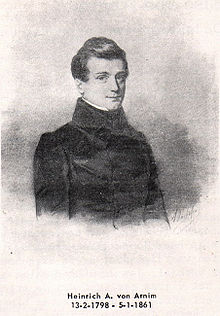Heinrich Alexander von Arnim
Heinrich Alexander von Arnim , from 1841 Freiherr von Arnim (born February 13, 1798 in Berlin , † January 5, 1861 in Düsseldorf ) was a Prussian statesman.
Life
Arnim received his education at the Halle Pedagogy , joined the Uckermark Landwehr riding in 1814 and took part in the wars of freedom with five brothers . He studied at the University of Berlin and became a member of the Corps Marchia in 1819 . In the Prussian civil service since 1820, he was first embassy attaché in Switzerland , then legation secretary in Munich , Copenhagen and Naples and in 1829 was appointed chargé d'affaires at the Grand Duchy of Hesse in Darmstadt . After he had worked successfully for the formation of the Prussian-Hessian Customs Union , he was appointed to the Ministry of Foreign Affairs as a lecturer in 1834, but by Friedrich Wilhelm IV. , With whom he was in closer personal contact, he was appointed envoy in Brussels in 1840 , Appointed in Paris in 1846. In these positions he earned great merit by vigorously representing the commercial interests of Germany, namely by bringing about the Belgian-Prussian trade agreement of September 1, 1844 and by the determination with which he officially and in his work Mein Handelsspolitisches Testament (Berlin 1844 ) opposed the prevailing protective customs views.
After the fall of the July monarchy (February 1848) he hurried to Berlin and on March 17 presented the king with a memorandum in which he urged liberal reforms and adherence to a German national policy. The important manifestation of the king for the German cause (March 21) emanated from him. On the same day he joined the new ministry, headed first by Adolf Heinrich von Arnim-Boitzenburg and then by Ludolf Camphausen , as Minister for Foreign Affairs , which, however, resigned on June 20.
Arnim then lived for a while as a private citizen in Neuwied and tried to work towards a mediating solution to the German question through a few pamphlets ( Frankfurt and Berlin , Frankfurt 1848; Über die Mediatationsfrage , Frankfurt 1849) . In 1850 he was a member of the state house of the Erfurt Union Parliament . He was an elected representative of Prussia by the Second Chamber of the Prussian Landtag. From 1849 to 1851 he was a member of the First Chamber, supported the German constitutional party and vigorously fought against the internal and the powerless foreign policy of the now victorious reaction. The publication of some “angry” speeches made an even bigger impression than his speeches and motions ( on the politics of the epigones in Prussia , Berlin 1850; on the politics of the counterrevolution in Prussia , Berlin 1851). Because of the latter pamphlet, Arnim was brought to justice at the instigation of the feudal party and, despite a brilliant defense that he later published, was sentenced to a fine. Since then, he lived far from the political scene until, after the overthrow of the Manteuffel Ministry in 1858, he was elected from Berlin's electoral district 3 to the Prussian House of Representatives, to which he belonged from 1859 to 1860. But his sickness prevented him from devoting his full strength to the new epoch of Prussian state life that was beginning at that time. He died on January 5, 1861 in Düsseldorf. Extensive knowledge, world experience and sincerity gave him an important personal reputation at an early stage.
literature
- Heinz Gollwitzer: Arnim-Suckow, Alexander Heinrich Freiherr von. In: New German Biography (NDB). Volume 1, Duncker & Humblot, Berlin 1953, ISBN 3-428-00182-6 , p. 368 f. ( Digitized version ).
- Carl Wippermann: Arnim-Suckow, Alexander Freiherr von . In: Allgemeine Deutsche Biographie (ADB). Volume 1, Duncker & Humblot, Leipzig 1875, pp. 571-574.
- Bernd Haunfelder : Biographical manual for the Prussian House of Representatives 1849–1867 (= manuals on the history of parliamentarism and political parties. Volume 5). Droste, Düsseldorf 1994, ISBN 3-7700-5181-5 , p. 48.
- Jochen Lengemann : The German Parliament (Erfurt Union Parliament) from 1850 , 2000, pp. 64–66.
Web links
- Literature by and about Heinrich Alexander von Arnim in the catalog of the German National Library
Individual evidence
- ↑ Kösener corps lists 1910, 10 , 132
| predecessor | Office | successor |
|---|---|---|
| Heinrich Friedrich von Arnim-Heinrichsdorff-Werbelow |
Prussian envoy in Paris 1846–1848 |
Maximilian von Hatzfeldt-Trachenberg |
| personal data | |
|---|---|
| SURNAME | Arnim, Heinrich Alexander von |
| ALTERNATIVE NAMES | Arnim-Suckow, Heinrich Alexander Freiherr von |
| BRIEF DESCRIPTION | Prussian statesman |
| DATE OF BIRTH | February 13, 1798 |
| PLACE OF BIRTH | Berlin |
| DATE OF DEATH | January 5, 1861 |
| Place of death | Dusseldorf |

